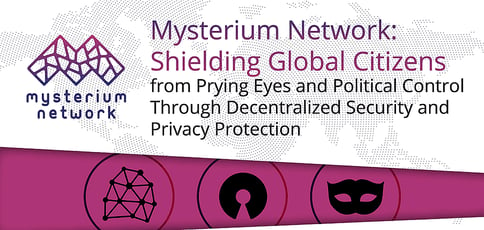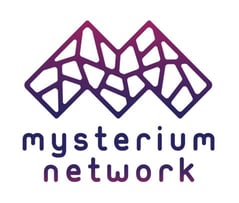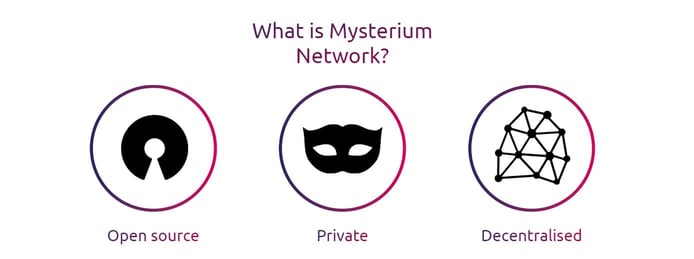
TL; DR: Mysterium Network, a self-sustained ecosystem that aims to provide security and privacy to all, is the world’s first decentralized network of VPN nodes. The system, powered by open-source technology, Ethereum, and smart contracts, operates under the distributed governance of node runners and end users. As Mysterium evolves, the technology has the potential to shape a more private and secure online future for users worldwide. //
As a society, our online norms vary wildly from their real-world counterparts. For the most part, strangers with differing opinions don’t shout profanities at us when we’re walking down the street. Internet trolls, on the other hand, feel entirely at ease posting inflammatory comments for online communities to see.
When we talk about privacy, the story’s the same. We’d immediately call the police on a stranger standing outside our bedroom window with binoculars. But online? Many of us are too uninformed, apathetic, or in denial to take proper action.
Robertas Visinskis, Founder of Mysterium Network, is not one of those people. After more than 13 years of high-level tech and leadership experience, Robertas became interested in decentralized, blockchain-based networks and consumed by privacy concerns.

Mysterium Network is building the first decentralized virtual private network.
“He was always thinking about privacy and security — how, in this new age, we’ve given control of our data to very powerful corporations that use it to market their products at the expense of consumer privacy,” said Andrius Zygmanta, Product Lead at Mysterium. “That bugged him a lot.”
At the same time, Robertas bought a small amount of Bitcoin and Ethereum tokens for his mother before a sudden spike sent the cryptocurrency soaring in value. “He was fascinated by how blockchain serves as a decentralized infrastructure for Bitcoin, and he started to think about its implications for security,” Andrius said.
Robertas had doubts as to the amount of privacy provided through a traditional VPN. “They’re centralized, meaning everything happens behind closed doors,” Andrius said. “Any company can say beautiful words about how secure they are, but it’s hard for them to prove anything — and that’s the main reason they are closed-source.”
So Robertas set out on a mission to create a distributed, blockchain-based VPN that provides open access and privacy to all Internet users — and, in 2010, Mysterium was born.
Today, the open-source network of decentralized VPN nodes, powered by Ethereum, operates under the distributed governance of node runners and end users. As Mysterium’s solution continues to develop, the network has the potential to lead us into a future that respects our security and privacy rights.
A Self-Sustainable Network Providing Open Access and Privacy to All
Mysterium believes strong encryption is crucial for a variety of users, from travelers visiting countries with internet censorship to journalists attempting to communicate with government whistleblowers. It’s also beneficial in protecting sensitive private communication on topics like politics, religion, and sexual orientation — which could potentially result in discrimination.
Once fully developed, Mysterium’s distributed peer-to-peer platform will empower users worldwide to avoid censorship imposed by third parties as well as offer a solution to the security problems rampant in today’s online environment.
Andrius said the technology first launched in a pre-alpha phase, called Mysterium Network TestNet, in early 2018. At the time, the company’s goals were to simulate user behavior and stability, identify critical issues, and gather feedback to inform future development.
“TestNet used our own nodes, which were custom software built by our core team,” Andrius said. “That launch was followed by the release of our desktop VPN app for MacOS, Windows, and, more recently, a mobile app for Android devices.”
The app, available at the Google Play store, allows Android users to participate in the decentralized VPN network while on the go. Through strong encryption, cryptographic hashing, reputation mechanisms, and layered protection protocols, the app provides a high level of privacy and anonymity.
The Mysterium VPN mobile app uses OpenVPN software that creates secure point-to-point connections in routed or bridged configurations and remote access facilities. Andrius told us that in January 2019, Mysterium became one of the first VPNs offering integration with WireGuard, an open-source VPN tunnel that uses cryptographic protocols. Upcoming versions of the Mysterium VPN app for mobile devices will also feature the WireGuard protocol.
Building a Decentralized Network of VPN Nodes
The Mysterium team has focused on creating open channels of communication within its user community through group instant messaging via Telegram and collaboration through Slack. Updates and other information is always available through the Mysterium site and on Twitter, Reddit, and Facebook.
“We try to engage potential users through various outlets to let them know who we are, what we’re building, and how they can become a part of it,” Andrius said.
As of the last quarter of 2018, Mysterium Network welcomed more than 6,000 unique users who engaged in more than 28,900 successful sessions. During those sessions, users securely transferred more than 10.82TB of data across the network, with an average session time of five hours and 32 minutes. Mysterium’s Android app is also doing well, with more than 1,000 installs since its December 2018 release.

The open-source, self-sustaining network will offer unmatched privacy levels.
Participation is currently limited to node runners who possess intermediate technical skills, though Mysterium is working to streamline the process in the future, therefore broadening accessibility. “We currently run a very small number of the nodes — active node users now run most of them, and this is without any incentivization,” he said. “I see a lot of potential for growth.”
Mysterium depends heavily on its node runners for feedback, insight, and development ideas. Last year, for example, users noticed that some nodes became unreachable, and the Mysterium team immediately investigated and remedied the issue through upgrades.
“We invite users to join us in building a future of security and privacy,” Andrius said.
Mysterium Protocol: Distributed Governance of Node Runners and Users
Andrius said the Mysterium road map is segmented into two distinct phases, each featuring various internal stages. The goal of Phase 1 is to build a fully decentralized VPN, or, in other words, an ecosystem of nodes and bandwidth users.
Phase II focuses on governing this network of node runners and end users through Mysterium Protocol. According to a whitepaper on the subject available on the Mysterium website, the organization’s vision is to build a Mysterium Protocol that will shred and encrypt data in an unrecognizable form, without the possibility that it will be traced or censored. At the receiving end, the Mysterium Protocol will reassemble the data.
When finalized, the Mysterium Protocol will govern how node runners and end users enter and exit the network, as well as navigate the encryption process.
“Mysterium protocol will eventually become a combination of different elements united into a coherent system,” the whitepaper’s authors stated. “Once complete, this protocol will ensure that user data cannot be overtaken, neither by nodes nor by third parties.”
Moving forward, Andrius said involvement from the open-source community is key. “The more support we get from the open-source community, the more we will expand,” he said. “People are joining already, we have open repositories, and everyone can participate in development.”
In the future, he said Mysterium Network will put even more focus on facilitating open-source development.
Blockchain Infrastructure Incentivized Through a Tokenomic Model
Down the line, Mysterium’s goal is to start incentivizing node runners based on usage. The network’s official currency, the MYST token, may be stored in any Ethereum account. The Ethereum blockchain will facilitate transactions within the network.
“We want node runners to get value out of sharing their bandwidth,” Andrius said. “This will be accomplished with our blockchain infrastructure.”
Incentivizing participation will help the Mysterium marketplace expand, creating a sustainable and growing ecosystem free of prying eyes and government censorship.
In the immediate feature, Mysterium has plans to participate in the Odyssey Hackathon 2019, the biggest blockchain hackathon in the world, which will take place from April 11 to 15. The company will specifically participate in the KLM Royal Dutch Airlines challenge, which is to co-create a working prototype for passengers to place biometric information on a smartphone.
HostingAdvice.com is a free online resource that offers valuable content and comparison services to users. To keep this resource 100% free, we receive compensation from many of the offers listed on the site. Along with key review factors, this compensation may impact how and where products appear across the site (including, for example, the order in which they appear). HostingAdvice.com does not include the entire universe of available offers. Editorial opinions expressed on the site are strictly our own and are not provided, endorsed, or approved by advertisers.
Our site is committed to publishing independent, accurate content guided by strict editorial guidelines. Before articles and reviews are published on our site, they undergo a thorough review process performed by a team of independent editors and subject-matter experts to ensure the content’s accuracy, timeliness, and impartiality. Our editorial team is separate and independent of our site’s advertisers, and the opinions they express on our site are their own. To read more about our team members and their editorial backgrounds, please visit our site’s About page.

